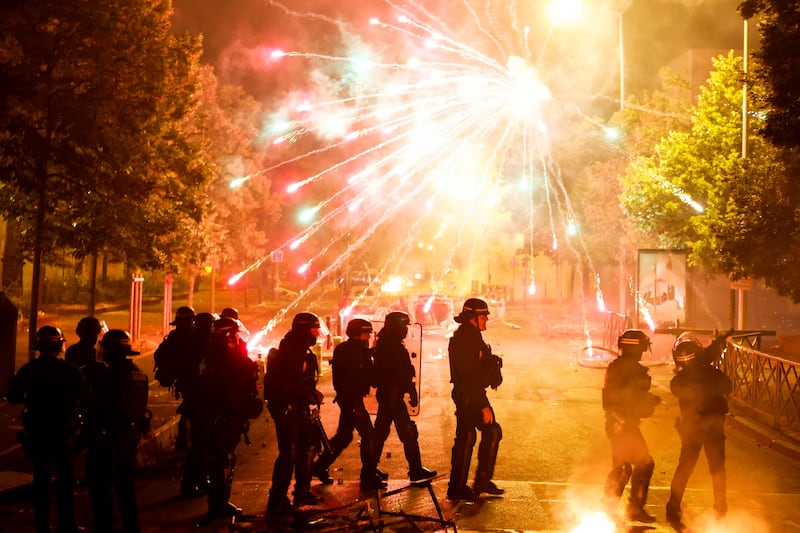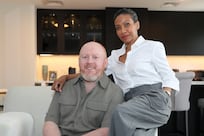Anne Hidalgo, the Mayor of Paris, had to brave the detritus of rioting to present the relay route for the torch in Paris to start the Olympic and Paralympic Games.
Long planned, the announcement was envisaged as a display of the “richness and diversity” of Paris during the final phase of the torch relay, on July 14, 2024.
Yet on Monday it was overshadowed by the worst riots in France in decades, in scenes that dealt a severe blow to the country’s image.
The death of a young man of North African heritage, Nahel M, after he was shot in the chest by a policeman for refusing to stop his car, set France ablaze.
What was at first an angry response to police violence and perceived racism turned into a general, seemingly senseless rampage.
For almost a week, rioters attacked symbols of the country’s public authority, including more than 100 town halls, and thousands of private shops. Insurance companies have given preliminary estimates of costs reaching close to €300 million.
Ms Hidalgo and her colleagues had to field questions about whether the government would be able to contain any more unrest before the Games.
The unifying power of sports suddenly seemed weakened by the violence, which reached levels unseen in France's 2005 riots.
“In a world that is not going well, in a country that shows extremely worrying signs, this flame is an extraordinary opportunity to carry hope,” said Ms Hidalgo.
Her deputy Emmanuel Gregoire, told reporters that he while he was “preoccupied” by the situation, he was not “particularly worried about its impact” on next summer’s games.
The Olympics as an opportunity
One man who might have benefitted from the 2024 Olympic Games was Nahel M, who played rugby in a local club supported by a youth group in his home town of Nanterre.
The organisation’s president, Jeff Puech, last week described Nahel as a teenager who had “real potential” and was “no big-time bandit”.
Nanterre had one of France’s biggest slums until the early 1970s. Figures from France’s National Institute of Statistics show that in 2020, almost a quarter of young people were unemployed.
Some say the Games represent an opportunity for Paris and its suburbs, because they have spurred the construction of several sports centres to be used after the competition ends.
In the suburbs, there is a dearth of such amenities, including swimming pools, mostly due to high population density and lack of public investment, local sources say.
Yet appetite for sport among youths is strong, and poorer cities such as Aubervilliers have produced national and international stars in football, mixed martial arts and hand-ball.
“The Games will be useful on the long term for Parisians,” Pierre Rabadan, deputy mayor of Paris in charge of the Olympic Games, told The National.
Mr Rabadan referred to “the rehabilitation of roads and improved public transport, the rehabilitation of sport infrastructure, the increased number of cycling paths”, and the cleaning of the Seine.
Some Olympic swimming competitions are scheduled to take place in the river. The public will be able to also swim in certain areas by 2025.
“We have noticed that Parisians have shown a real enthusiasm for the Games in the past months,” said Mr Rabadan.
“The Games are above all a great popular celebration, beyond the competition and sporting results.”
In Paris, the only new infrastructure to be built inside the city's perimeters is the Arena hub for the Games' badminton and rhythmic gymnastics.
With a capacity of 8,000 seats after the Games, it aims to lead “the renewal of the La Chapelle neighbourhood, which links Paris to [the north-eastern department of] Seine-Saint-Denis,” said Mr Rabadan.
Seine-Saint-Denis is also where Nahel M's sport of choice, rugby, will be played during next summer's Games, at country's largest stadium, the Stade de France.
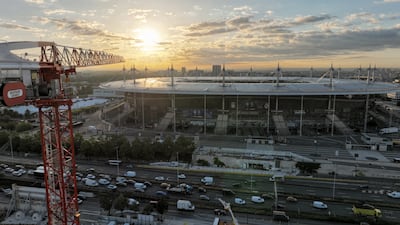
The stadium overlooks a large swimming pool under construction, where synchronised swimming, water polo and diving events will be held.
The aquatics centre “is a meaningful public investment for Seine-Saint-Denis, which is seriously lacking in sports facilities today”, reads the Paris 2024 Olympic Games website.
“The Aquatics Centre will be low-carbon and all the building materials will be bio-based. Its timber structure and roof frame are thought out to blend seamlessly into the surrounding greenery.”
Yet reality stands in stark contrast to the glowing description of the future swimming pool’s environment.
The aquatics centre’s construction site and the Stade de France are separated by a six-lane motorway. By the end of the year, they are expected to be connected by a bridge, which is still being built.
For the moment, the only connection between the two buildings is an underpass, a picture of desolation that sits next to one of the Olympics’ flagship projects.
When The National visited this week, mangled plastic and a large black stain were visible on the pavement near the stairs leading to the underpass – what seemed to be the remnants of a dumpster set ablaze.
Inside the tunnel, young homeless boys slept on mattresses, their belongings in plastic bags next to them.
Fifteen kilometres east of the site, a smaller swimming pool being built for athletes' training was “lightly” damaged last week in the city of Aubervilliers, local authorities say.
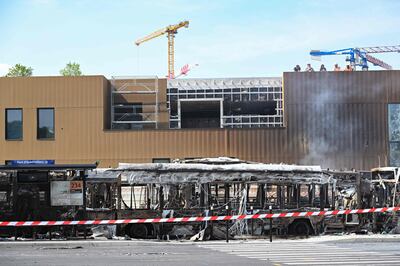
Rioters on June 30 set fire to a dozen public buses parked near the construction site.
While few believe that last week’s riots imperil the Olympics, they have raised questions about how the government is going to manage security during the event, which is expected to attract 15 million tourists.
France has successfully hosted large sporting events in the past, such as the Euro football championship in 2016, but mishaps have also occurred.
It remains to be seen how the state will respond to the heightened social tension brought on by the riots.
Recent sporting events incidents include chaotic scenes outside the Stade de France at a 2022 Champions League final, which made headlines as police sprayed fans with tear gas.
A report concluded in February that the Union of European Football Associations was to blame, but it also criticised “defective” policing.
The Rugby World Cup, which will be held in France this year, will test security once again.
The French Sports Ministry, Interior Ministry and Paris police headquarters did not answer requests for comment.
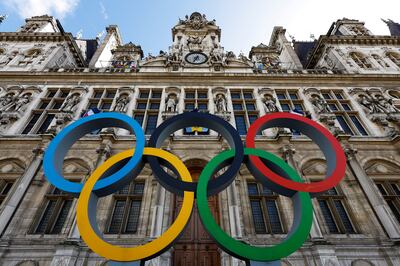
But on the ground, security had changed little since riots started. The future Aubervilliers pool’s outside wall remained blackened from the blaze and the charred buses were cleared.
A guard at the construction site said one extra person was on shift over the weekend, and that he had since left.
Gesturing towards the empty space where the buses once stood, the young man in his twenties said: “They burned down public property. Why?”
No one in the area had any clear answer to his question. And many fear that little is needed to reawaken the violence.
Racism? A “possibility”
Stephane Chaufourier, 50, a former national wrestling champion who runs a sports club in Aubervilliers with a strong focus on psycho-social support for marginalised youths, listed many issues, from pockets of poverty to education problems.
“Young people are wondering why they’re all cooped in high-rise buildings, living at five in a two-room flat, when that’s not how people live inside Paris,” he said.
“They don’t feel that they are heard, and their answer is to break everything. It’s sad but that’s how they think.”
Mr Chaufourier’s Atch Academy is full of young men with similar backgrounds to Nahel M, who had reportedly dropped out of school in the past months and lived alone with his mother.
“Nahel is exactly the kind of person you can find here,” he said.
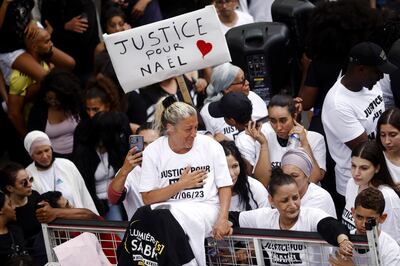
Many young men at the sports club view him as a father figure, he said.
“It’s 50-50. We’re here to develop sports activities but people also confide in us. I give advice when I feel it’s right.”
Mr Chaufourier identifies with Nahel M because he also grew up with a single mother.
“It wasn’t easy, I could have spiralled out of control at any moment,” he said. “I can imagine that it’s the same for young people today. They need someone to reach out to them.”
But he was reluctant to describe French police as racist despite accusations made by Nahel M's mother, who said officers “saw an Arab face” and “wanted to take his life”.
The suburbs are a tough environment for the police.
“They get insulted 15 or 20 times a day. So on the 20th time, it's normal that they lose it,” said Mr Chaufourier.
“Of course, there's losing it, and losing it,” he said, clarifying that the death of Nahel M was not excusable.
The UN last week called on France to address “deep issues” of racism in policing. Paris police chief Laurent Nunez on Sunday rejected the UN's claim.
Atch Academy's community manager in training, 21-year old Stevie, who was born in France of Cameroonian parents, said he experienced what he perceived as police racism once, when he was 16.
Police behaved aggressively with him and more respectfully towards a white friend when they were stopped for questioning one night in a neighbourhood known for drug trafficking in the suburb of Pantin.
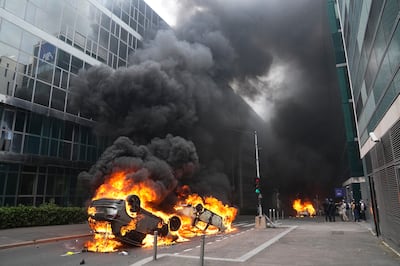
“I don't want to say that all policemen are racist,” said Stevie. “But from what I see, the police do not behave the same depending on whether the person is black or white. It's a pity.”
When The National visited the Atch Academy, only adults were training because of school holidays.
In the streets, teenagers said they disapproved of the rioting and looting that followed Nahel’s death, although they were angered by his killing.
“I went down to the street the first night but went home quickly after they started throwing fireworks at police,” said Quentin, 15, as he walked through Aubervilliers on his way to a Greek restaurant with two friends.
He said he knew teenagers who took part in the riots “for the thrill of it” and had little interest in Nahel's case.
Asked about racism, the boys shrugged. “It's a possibility,” they said.
They said they their mothers implement a strict curfew of 6pm.
“There were people as young as 11 years old who took part in the riots,” claimed Quentin. “It was easy to buy fireworks and crackers. They cost €11.”
His friend Yannick said he used to follow judo classes at Atch Academy but took a year’s pause to focus on school.
All three boys said that apart from sports and video games, there was little to do for teenagers in Aubervilliers.
“Except eating. I like eating,” said Quentin.
“What do you mean?” interjected Yannick. “You can do sports for hours. When you eat, it’s over in two minutes.”
'Society is sick'
Public officials seem overwhelmed by the situation.
Questioned by French television, Aubervilliers' Mayor Karine Franclet on Tuesday said that the situation was “so unprecedented that no one can know how it will evolve”.
“We saw with the tragic death of Nahel that all that is needed is a spark for emotions to spill over,” said Ms Franclet, a member of a centre-right political party.
A former school principal, she ended the communist party’s quasi-continuous 70-year hold over Aubervilliers when she won local elections in 2020.
Ms Franclet called for a firm police response while also criticising the lack of state support for parents who struggled with their children.
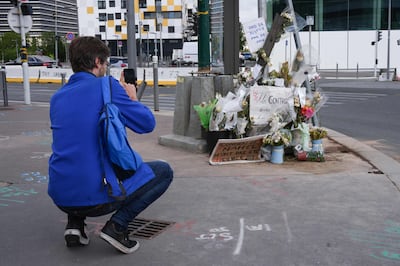
She said that in her former job, she had helped overwhelmed parents file a request for an educator for their son, 12.
Yet there were not enough educators to accommodate their request, and two years later, Ms Franclet had to expel their son for dealing drugs at school.
“Child welfare is in a hopeless state,” she said. “Society is sick and we need surgical responses, city by city.”
Mr Chaufourier made similar complaints, saying he only recently started receiving financial support from the town hall, two decades after launching Atch Academy.
It has recently expanded to the neighbouring suburbs of Bobigny and Pantin and has 2,400 members.
He said interest was triggered by some of its members winning world championships. On July 1, Ms Franclet awarded double MMA world champion Salahdine Parnasse, 25, a medal for his “exceptional career”.
“Investments are needed,” said Mr Chaufourier. “We’ve been doing this for 20 years and it’s not easy at all.”
But he also believes that for today’s young generation’s life is harder than it was for his. Life is more expensive and young people are more aware of social inequalities through social media, he said.
Yet even Mr Chaufourier says that he was shocked by the recent violence by rioters, which he says has worsened over the years.
“Imagine – they’re 13 or 14 years old and they’re not afraid of police. They loot shops. What are they going to be like when they turn 16 or 17?” he asked.
